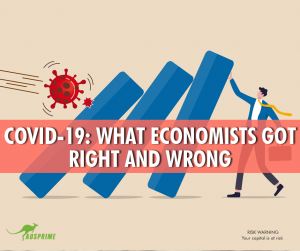Covid-19: What Economists got Right and Wrong

Who ever wondered in one year everything would collapse in one just month? The recovery period will be for sure long. Economists at the begging of the pandemic they came up with some predictions-worries about how the government will face the pandemic crisis.
One of these was how will the government intervene and how the vaccination would be. Once the pandemic hit US everything was collapsed. It was obvious from the first month where 17 million Americans were suddenly unemployed. Even in 2008 financial crisis was better if we count the gross domestic product faced $2.15 fall.
Mr Knoop, from Cornell College, as predicted last year the US government took a spending and monetary policy to avoid the worst-case scenario like 2008 crisis and from the total collapse of the economy. And so, it happened by the government passed aid packages, which helped people even if they weren’t working.
US government has successfully avoided the big part of crisis, and this shows the GDP rebounded to 6,4% from the first trimester of the year. In addition, unemployment rate is higher than it was before the pandemic because 15 million Americans went back to their jobs. On the other hand, small businesses are affected from the pandemic, and this is some damage to the economy.
We were all expecting that some industries would be affected from the pandemic, or even not to make it through. The predictions weren’t wrong as this helped tech-heavy companies such as Amazon, Netflix, Shopify and more. The industries affected were customer-based companies like travel and some retail. Jeff Bezos personal wealth grow to $202bn according to Bloomberg’s Billionaire Index as Amazon tripled its profits. No need to say that hospitality and transportation industries collapsed economically, National Restaurant Association claimed a loss of $115bn in sales, by comparing with last year’s sales.
Finally, prediction was if vaccines would be the “lifeboat” for economy. 16th of March 2020 Dow Jones dropped 3000 points, of course everyone was panicked. But what if there was a light in the tunnel? Well the answer was the vaccine. Wall Street did rebound. 16th of April stock market reached record highs since 16th of March 2020 when 40% of Americans received at least 1 dose of the vaccine. Note that Dow Jones almost doubled reaching an all-time high 34,200.67 points and keeps rising.
With this boom though how will affect the long-term economy? Economists still stay cautious. In general market is back to normal like it was before pandemic, low interest rates pushed people to make some decisions. Some of them is to buy their dream house or even taking big loans for their businesses as a result this will affect the economy if it collapses in the future.
The main worry to make the economy drop again would be if the vaccines are resistant to new variants of Covid or if the vaccine has problem to delivery. This could affect the delay to countries who are still waiting the vaccine and mutations are more easily developed.
The rise of both interest rates and the prices of ordinary goods can be triggered, as governments are borrowing money to lift the economies with additional spending. This can be counted as a long-term consequence in a few years.
Low paid workers are still affected from the pandemic as their jobs disappear or their hours are less where essential workers still work putting away their health and safety. So, it does inequality which is bad for the economic growth. Out of this, it is more possible to trigger negative effects such as health, wealth, crime and education. Bad educational outcomes will affect in the near future the economic growth.
SOURCE:BBC.COM
